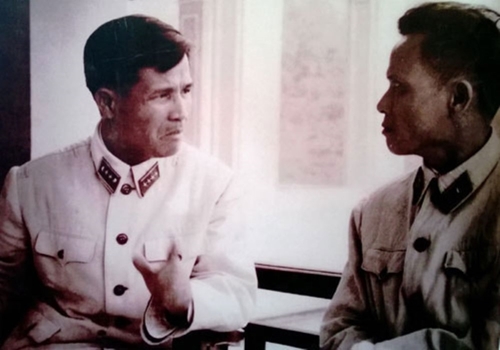Those watershed periods of time proved the qualities and capabilities of the strategic leader and excellent commander of the Vietnam People’s Army.
Inheriting the traditions of his hometown and family, young man Nguyen Vinh (General Nguyen Chi Thanh’s birth-name) was awake to the revolutionary ideas and fully aware of his responsibility to follow the struggle for national independence and freedom and happiness of the people. That was the great source of motivation for the young man to become a staunch communist, an excellent militant and politician, a talented and virtuous general, and an excellent commander trusted, loved, and respected by the whole military.
    |
 |
|
General Nguyen Chi Thanh exchanges with Major General Chu Huy Man before heading to the Southern theater in 1964. (Photo: bqllang.gov.vn) |
In late 1946 and early 1947, under the brutal repression of the French colonialists and their henchmen, the revolutionary movement in Thua Thien and Binh-Tri-Thien Sub-region encountered countless difficulties and was at risk of disintegration. The Party Central Committee and President Ho Chi Minh entrusted comrade Nguyen Chi Thanh with taking on the position of Secretary of the Thua Thien provincial Party Committee and then the Secretary of the Binh-Tri-Thien Sub-region's Party Committee and the Secretary of the Party Committee of Inter-region 4.
Having carefully analyzed and evaluated the situation, General Nguyen Chi Thanh realized that the Vietnamese troops were heroic, and the Vietnamese people’s revolutionary spirit was high; however, party cadres and members did not know how to effectively train and command people to fight the enemy. From that, comrade Nguyen Chi Thanh had a famous saying, "Losing land does not mean losing the country; we are only afraid of losing the people's trust; having people's trust means having everything," which encouraged officers, soldiers, and people to build, consolidate, and expand the revolutionary movement and strengthen the movement in Binh-Tri-Thien, greatly contributing to the victory of the resistance war against the French colonialists.
To meet the requirements of developing the Vietnam People's Army and strengthening the Party's leadership over the military, on July 11, 1950, President Ho Chi Minh signed Decree No.122/SL appointing comrade Nguyen Chi Thanh as Chief of the General Department of Political Affairs.
In the position, with sharp and creative thinking, scientific working style, and closeness to units and troops, the General clearly determined the role, nature, content, importance, and effectiveness of party and political work and considered it the "soul and lifeblood" of the military; a matter of principle to build a politically-, ideologically-, and organizationally-strong military bearing the nature of the working class, the people's and national characteristics; the source of combat power, ensuring that the military will always be ready to undertake and successfully complete all tasks assigned by the Party, State, and people in any circumstances.
General Nguyen Chi Thanh directed the building and consolidation of political agencies and political staff in terms of quantity and quality in combination with the “strong, close, and widespread” system of party organizations. First, he was determined to build the General Department of Political Affairs strong in all aspects, deserving to be a strategic advisory agency to help the Party, the General Military Commission (present Central Military Commission), and the Commander-in-Chief issue guidelines, contents, and measures to enhance the effectiveness of leadership and direction over party and political work in the military.
The General devoted his heart to and exerted utmost efforts in studying, building, supplement, and perfecting the system of principles and operation regulations for party and political work in the military, contributing to building the military of the people, of the working class and that is sure to win.
In the second half of 1964, the "Special Warfare" strategy was on the edge of the total bankruptcy, the U.S. imperialists and their allies massively sent expeditionary, professional, and battle-hardened troops to the South to conduct the "localized" warfare and escalate raids on the North using the air and naval forces with the scheme to break the Vietnamese troops and people’s spirit and will. In that circumstance, the Politburo and President Ho Chi Minh appointed General Nguyen Chi Thanh to assume the position of Secretary of the Central Office for South Vietnam and Political Commissar of the Liberation Armed Forces of South Vietnam to direct the revolutionary movement in the Southern theater to liberate the South and reunify the country.
With a profound strategic vision and the spirit of "daring to fight the U.S. troops, we will know how to fight and definitely win over them," the General directly studied the battlefield, closely grasped, and accurately assessed the situation and balance of power between our forces and the enemy’s ones, came up with creative methods to promote our forte, combat style, and strength while eliminating enemy's advantage of modern weapons and equipment. The “grasping the enemy’s belt to fight” motto in the Southern theater contributed to defeating the "localized" warfare, marking a turning point in the development of the revolution in the South.
General Nguyen Chi Thanh, with his righteousness and wisdom, greatly contributed to the military’s building, combat, victory, and development. He is also a source of encouragement and an exemplary person for officers and soldiers in the whole military to study and follow while implementing the Party's guidelines, the State's policies and laws, and the Central Military Commission and Defense Ministry’s resolutions, directives, plans on building an elite, compact, strong, revolutionary, regular, and modernized military, contributing to successfully fulfilling the task of military building, national defense consolidation, Fatherland protection, and prosperous and happy country development.
By Sr. Col., Dr. Thai Doan Tuoc
Translated by Tran Hoai